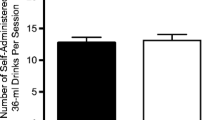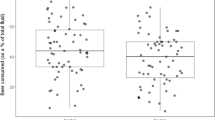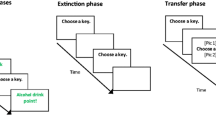Abstract
Rationale
Caffeinated alcoholic beverages have been associated with increased risk of alcohol-related harms. However, few studies have examined these combined effects on behavioural control, which is believed to underlie many of the negative effects of alcohol consumption. In addition, studies have often omitted subjective measures, and none have directly assessed the role of caffeine consumer history.
Objectives
To examine the combined effects of alcohol and caffeine on measures of behavioural control and perceived intoxication in abstinent, light caffeine consumers.
Methods
Participants (n = 28; 50% male) attended four sessions at which they consumed one of the following beverages in a randomised order: placebo, alcohol alone (0.6 g/kg), caffeine alone (2.0 mg/kg), and alcohol/caffeine. They completed measures of mood, intoxication, anxiety and alcohol craving before and after a task battery comprising measures of behavioural control and reaction time performance.
Results
Caffeine attenuated alcohol-related performance deficits on stop-signal accuracy, had no effect on go–no-go performance deficits, and worsened accuracy on the Stroop task. Caffeine did not influence absolute changes in perceived intoxication but there was suggestion that caffeine may have changed the nature of intoxication with increases in stimulation.
Conclusions
Caffeine appears to have mixed effects on alcohol intoxication that are task-dependent. We found increased stimulation in the alcohol/caffeine condition, supporting the contention that caffeinated alcoholic beverages enable an individual to drink for longer. Future research should model real world drinking behaviour by examining how these effects change across multiple drink administrations.


Similar content being viewed by others
References
Attwood AS, Higgs S, Terry P (2007) Differential responsiveness to caffeine and perceived effects of caffeine in moderate and high regular caffeine consumers. Psychopharmacology (Berl) 190(4):469–477
Azcona O, Barbanoj MJ, Torrent J, Jane F (1995) Evaluation of the central effects of alcohol and caffeine interaction. Br J Clin Pharmacol 40(4):393–400
Benac N (2010) US Food and Drug Administration signals crackdown on caffeinated alcohol drinks. CMAJ.
Bohn MJ, Krahn DD, Staehler BA (1995) Development and initial validation of a measure of drinking urges in abstinent alcoholics. Alcohol Clin Exp Res 19(3):600–606
Brice CF, Smith AP (2002) Effects of caffeine on mood and performance: a study of realistic consumption. Psychopharmacology (Berl) 164(2):188–192
Drake CL, Roehrs T, Turner L, Scofield HM, Roth T (2003) Caffeine reversal of ethanol effects on the multiple sleep latency test, memory, and psychomotor performance. Neuropsychopharmacology 28(2):371–378
Eysenck HJ, Eysenck SBG (1991) The Eysenck Personality Questionnaire—Revised: London: Hodder and Stoughton.
Ferreira SE, de Mello MT, Rossi MV, Souza-Formigoni ML (2004) Does an energy drink modify the effects of alcohol in a maximal effort test? Alcohol Clin Exp Res 28(9):1408–1412
Ferreira SE, de Mello MT, Pompeia S, de Souza-Formigoni ML (2006) Effects of energy drink ingestion on alcohol intoxication. Alcohol Clin Exp Res 30(4):598–605
Fillmore MT, Vogel-Sprott M (1999) An alcohol model of impaired inhibitory control and its treatment in humans. Exp Clin Psychopharmacol 7(1):49–55
Grattan-Miscio KE, Vogel-Sprott M (2005) Alcohol, intentional control, and inappropriate behavior: regulation by caffeine or an incentive. Exp Clin Psychopharmacol 13(1):48–55
Heatherley SV, Hayward RC, Seers HE, Rogers PJ (2005) Cognitive and psychomotor performance, mood, and pressor effects of caffeine after 4, 6 and 8 h caffeine abstinence. Psychopharmacology (Berl) 178(4):461–470
Howland J, Rohsenow DJ, Arnedt JT, Bliss CA, Hunt SK, Calise TV et al (2010) The acute effects of caffeinated versus non-caffeinated alcoholic beverage on driving performance and attention/reaction time. Addiction 106(2):335–341
Howland J, Rohsenow DJ, Calise TV, Mackillop J, Metrik J (2011) Caffeinated alcoholic beverages: an emerging public health problem. Am J Prev Med 40(2):268–271
Lieberman HR, Wurtman RJ, Emde GG, Roberts C, Coviella IL (1987) The effects of low doses of caffeine on human performance and mood. Psychopharmacology (Berl) 92(3):308–312
Liguori A, Robinson JH (2001) Caffeine antagonism of alcohol-induced driving impairment. Drug Alcohol Depend 63(2):123–129
Mackay M, Tiplady B, Scholey AB (2002) Interactions between alcohol and caffeine in relation to psychomotor speed and accuracy. Hum Psychopharmacol 17(3):151–156
Malinauskas BM, Aeby VG, Overton RF, Carpenter-Aeby T, Barber-Heidal K (2007) A survey of energy drink consumption patterns among college students. Nutr J 6:35
Marczinski CA, Fillmore MT (2003) Dissociative antagonistic effects of caffeine on alcohol-induced impairment of behavioral control. Exp Clin Psychopharmacol 11(3):228–236
Marczinski CA, Fillmore MT (2006) Clubgoers and their trendy cocktails: implications of mixing caffeine into alcohol on information processing and subjective reports of intoxication. Exp Clin Psychopharmacol 14(4):450–458
Martin CS, Earleywine M, Musty RE, Perrine MW, Swift RM (1993) Development and validation of the Biphasic Alcohol Effects Scale. Alcohol Clin Exp Res 17(1):140–146
Mulvihill LE, Skilling TA, VogelSprott M (1997) Alcohol and the ability to inhibit behavior in men and women. J Stud Alcohol 58(6):600–605
O’Brien MC, McCoy TP, Rhodes SD, Wagoner A, Wolfson M (2008) Caffeinated cocktails: energy drink consumption, high-risk drinking, and alcohol-related consequences among college students. Acad Emerg Med 15(5):453–460
Oteri A, Salvo F, Caputi AP, Calapai G (2007) Intake of energy drinks in association with alcoholic beverages in a cohort of students of the School of Medicine of the University of Messina. Alcohol Clin Exp Res 31(10):1677–1680
Rogers PJ, Martin J, Smith C, Heatherley SV, Smit HJ (2003) Absence of reinforcing, mood and psychomotor performance effects of caffeine in habitual non-consumers of caffeine. Psychopharmacology (Berl) 167(1):54–62
Rogers PJ, Hohoff C, Heatherley SV, Mullings EL, Maxfield PJ, Evershed RP et al (2010) Association of the anxiogenic and alerting effects of caffeine with ADORA2A and ADORA1 polymorphisms and habitual level of caffeine consumption. Neuropsychopharmacology 35(9):1973–1983
Rose AK, Duka T (2007) The influence of alcohol on basic motoric and cognitive disinhibition. Alcohol Alcohol 42:544–551
Saunders JB, Aasland OG, Babor TF, de la Fuente JR, Grant M (1993) Development of the Alcohol Use Disorders Identification Test (AUDIT): WHO collaborative project on early detection of persons with harmful alcohol consumption—II. Addiction 88(6):791–804
Smit HJ, Rogers PJ (2000) Effects of low doses of caffeine on cognitive performance, mood and thirst in low and higher caffeine consumers. Psychopharmacology (Berl) 152(2):167–173
Smith A, Kendrick A, Maben A, Salmon J (1994a) Effects of breakfast and caffeine on cognitive performance, mood and cardiovascular functioning. Appetite 22(1):39–55
Smith A, Maben A, Brockman P (1994b) Effects of evening meals and caffeine on cognitive performance, mood and cardiovascular functioning. Appetite 22(1):57–65
Spielberger CD, Gorush RL, Lushene R, Vagg PR, Jacobs GA (1983) Manual for the state trait anxiety inventory. Consulting Psychologists Press, Palo Alto
Thombs DL, O’Mara RJ, Tsukamoto M, Rossheim ME, Weiler RM, Merves ML et al (2010) Event-level analyses of energy drink consumption and alcohol intoxication in bar patrons. Addict Behav 35(4):325–330
Weldy DL (2010) Risks of alcoholic energy drinks for youth. J Am Board Fam Med 23(4):555–558
Acknowledgments
This study was funded by a School of Experimental Psychology, University of Bristol small grant award to ASA. Peter Rogers has received funding from GlaxoSmithKline for psychopharmacological research on caffeine.
Author information
Authors and Affiliations
Corresponding author
Rights and permissions
About this article
Cite this article
Attwood, A.S., Rogers, P.J., Ataya, A.F. et al. Effects of caffeine on alcohol-related changes in behavioural control and perceived intoxication in light caffeine consumers. Psychopharmacology 221, 551–560 (2012). https://doi.org/10.1007/s00213-011-2601-0
Received:
Accepted:
Published:
Issue Date:
DOI: https://doi.org/10.1007/s00213-011-2601-0




